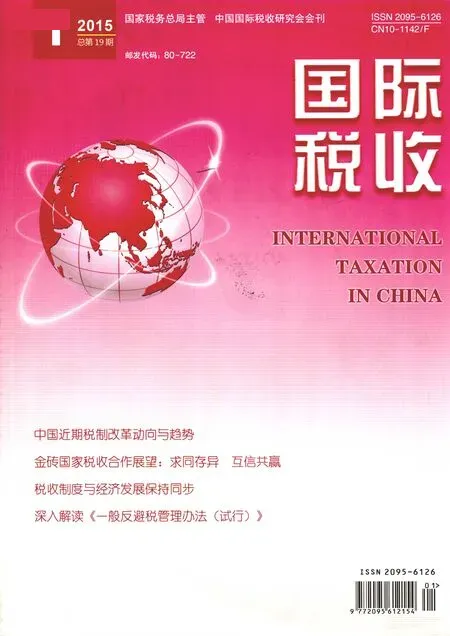国家税务总局发布《一般反避税管理办法(试行)》(上)
2015-01-01张瑛,邓力平
国家税务总局发布《一般反避税管理办法(试行)》(上)
State Administration of Taxation Released Administrative Measures on the General Anti-Avoidance Rule (Trial) (PartⅠ)
2014年12月2日,国家税务总局发布《一般反避税管理办法(试行)》(国家税务总局令第32号,以下简称“办法”),进一步规范和明确了税务机关采取一般反避税措施的适用范围、判断标准、调整方法、工作程序、争议处理、“税收利益”的含义和“避税安排”的主要特征等相关问题。《办法》的主要内容如下:
On December 2nd, 2014, the State Administration of Taxation released Administrative Measures on the General Anti-Avoidance Rule (Trial) (Order No. 32 of the State Administration of Taxation, hereinafter referred to as 'the Measures') to further regulate and clarify issues related to the implementation of the General Anti-Avoidance Rule by Chinese tax authorities, such as applicable scope, judgment criterion, adjustment method, working procedure, dispute resolution, definition of 'tax benefit', major features of a 'tax avoidance arrangement', etc. The main contents of the Measures are as follows:
第一章 总 则
Chapter 1 General Rules
第一条 为规范一般反避税管理,根据《中华人民共和国企业所得税法》(以下简称企业所得税法)及其实施条例、《中华人民共和国税收征收管理法》(以下简称税收征管法)及其实施细则,制定本办法。
Article 1 In order to regulate the administration of general antiavoidance, the Measures is formulated in accordance with the Enterprise Income Tax Law of People's Republic of China (hereinafter referred to as the Enterprise Income Tax Law) and its Implementation Rules, the Tax Collection and Administration Law of People's Republic of China (hereinafter referred to as the Tax Collection and Administration Law) and its Implementation Rules.
第二条 本办法适用于税务机关按照企业所得税法第四十七条、企业所得税法实施条例第一百二十条的规定,对企业实施的不具有合理商业目的而获取税收利益的避税安排,实施的特别纳税调整。
下列情况不适用本办法:
(一)与跨境交易或者支付无关的安排;
(二)涉嫌逃避缴纳税款、逃避追缴欠税、骗税、抗税以及虚开发票等税收违法行为。
Article 2 The Measures shall apply to the special tax adjustments made by tax authorities in accordance with Article 47 of the Enterprise Income Tax Law and Article 120 of its Implementation Rules on any tax avoidance arrangements which are entered into to obtain tax benefits without a reasonable commercial purpose.
The Measures is not applicable to the following conditions:
A. Arrangements which are not related to cross-border transaction or cross-border payment;
B. Taxation offence such as tax dodging, avoiding paying taxes due for recovery claim from tax authorities, tax fraud, refusing to pay taxes and falsifying invoices.
最后,还是周大毛来解了围,说,以前呢搞是搞过的,但搞得少,现在是有得搞了,所以赶紧回家去搞吧。然后推了一把驮子,驮子便从笑声的圆晕里荡漾出去,当然这个荡漾是用逃也似的方式离去的。于是老樟树下哄的一声又炸开了,看看,看看,大白天去搞女人去啦。
第三条 税收利益是指减少、免除或者推迟缴纳企业所得税应纳税额。
Article 3 A tax benefit refers to a tax reduction, exemption or deferral of the tax amount payable of enterprise income tax.
第四条 避税安排具有以下特征:
(一)以获取税收利益为唯一目的或者主要目的;
(二)以形式符合税法规定、但与其经济实质不符的方式获取税收利益。
Article 4 A tax avoidance arrangement has the following features:
A. The sole or main purpose is to obtain tax benefits;
B. Tax benefit is obtained by using a scheme which formally conforms to the tax laws and regulations but in reality not to the economic substance.
第五条 税务机关应当以具有合理商业目的和经济实质的类似安排为基准,按照实质重于形式的原则实施特别纳税调整。调整方法包括:
(一)对安排的全部或者部分交易重新定性;
(二)在税收上否定交易方的存在,或者将该交易方与其他交易方视为同一实体;
(三)对相关所得、扣除、税收优惠、境外税收抵免等重新定性或者在交易各方间重新分配;
(四)其他合理方法。
Article 5 Tax authorities shall make special tax adjustments by adhering to the substance over form principle and by reference to similar arrangements with reasonable commercial purpose and economic substance. The methods of special tax adjustments include:
A. Redefine part or whole of the arrangement;
B. Repudiate the existence of a transaction party for tax purpose, or treating the transaction party and other parties as one entity;
C. Redefine relevant income, deduction, tax incentive or foreign tax credit or reallocate them among transaction parties;
D. Any other reasonable method.
第六条 企业的安排属于转让定价、成本分摊、受控外国企业、资本弱化等其他特别纳税调整范围的,应当首先适用其他特别纳税调整相关规定。
企业的安排属于受益所有人、利益限制等税收协定执行范围的,应当首先适用税收协定执行的相关规定。
(未完待续)
Article 6 Special tax adjustments rules on transfer pricing, cost sharing arrangement, controlled foreign company, thin capitalization, etc., should be applied first.
For the tax arrangements governed by the tax treaty provisions on beneficial owner, benefit limitation, etc., the tax treaty provisions should be applied first.
(To be continued)
翻译:张 瑛
审定:邓力平
Translator : Ying Zhang
Proofreader : Liping Deng
责任编辑:惠 知
